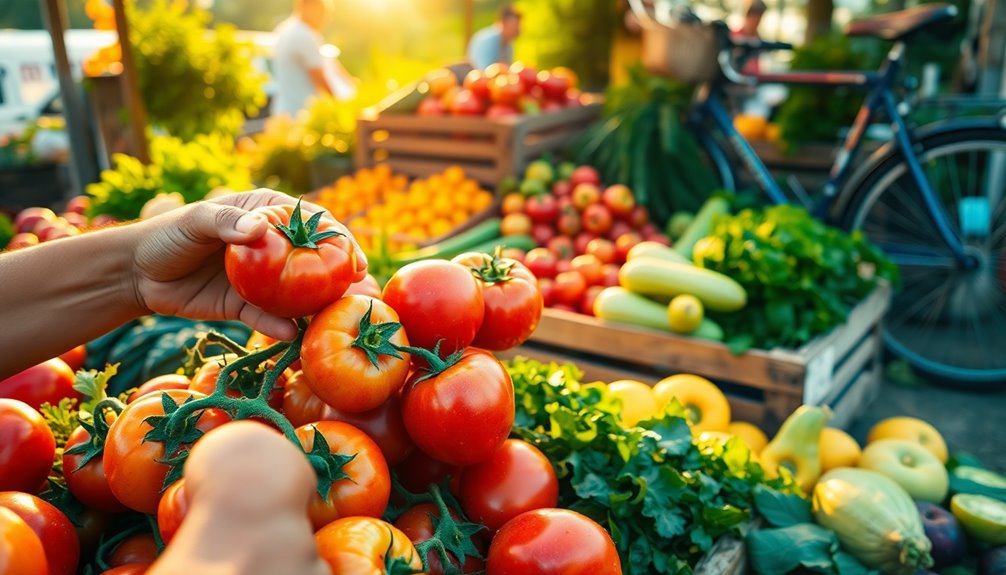To reduce your carbon footprint through your diet, focus on plant-based meals that lower greenhouse gas emissions meaningfully. Cut back on meat and dairy, which have higher carbon footprints, and opt for sustainable seafood instead. Support local and seasonal foods to minimize resource use and boost your community. Avoid food waste by planning meals and composting leftovers, turning excess into something useful. You might also consider growing your own herbs or vegetables for fresher options. Sustainable eating habits benefit the planet, and exploring these can inspire even more impactful choices as you continue on this journey.
Key Takeaways
- Embrace a plant-based diet, as it significantly lowers greenhouse gas emissions compared to meat and dairy consumption.
- Choose seasonal and locally-sourced foods to reduce transportation emissions and support sustainable agriculture.
- Minimize food waste by planning meals, composting leftovers, and creatively using versatile ingredients.
- Opt for sustainable seafood to protect marine habitats and reduce bycatch, benefiting both the environment and local communities.
- Educate yourself and others about sustainable eating practices to inspire collective action towards reducing carbon footprints.
Understand Your Carbon Footprint
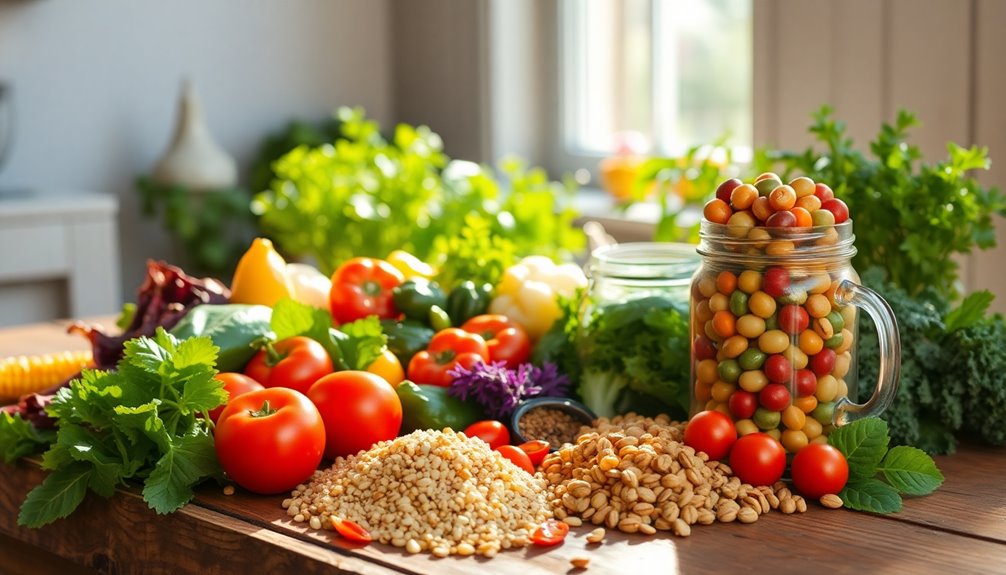
Understanding your carbon footprint is vital for anyone looking to make a meaningful impact on the environment. Your carbon footprint refers to the total greenhouse gas emissions caused directly and indirectly by your activities, particularly through your diet. To start, you can calculate your impact by examining the types of foods you consume and their origins.
For instance, meat and dairy often have a higher carbon footprint than plant-based foods, so understanding this difference is pivotal.
Once you've calculated your footprint, it's time to make changes. Small adjustments can lead to significant reductions in your carbon emissions. Start by incorporating more plant-based meals into your week; even replacing one meal a day can make a difference. A plant-based diet offers significant health benefits that further motivate sustainable eating choices.
You might also want to explore alternative proteins, like legumes or nuts, which typically have a lower environmental impact.
Moreover, consider your food waste. Reducing waste not only conserves resources but also cuts down on the methane emissions released from landfills. You can do this by planning your meals, storing food properly, and using leftovers creatively.
Choose Local and Seasonal Foods
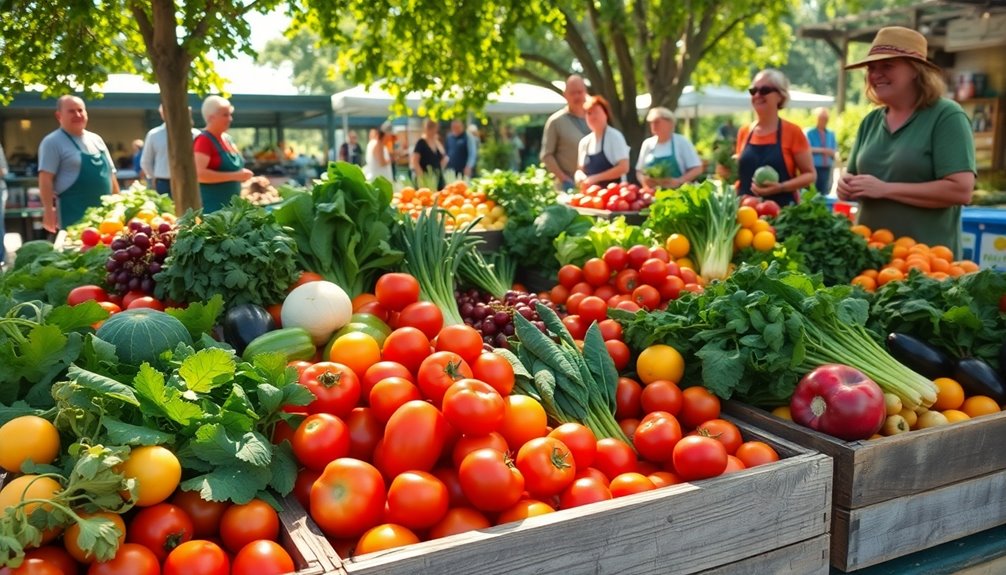
Choosing indigenous and seasonal foods can significantly diminish your carbon footprint while also backing your community. When you select ingredients cultivated nearby, you're not only relishing fresher produce but also reducing transportation emissions. This simple alteration in your shopping habits can have a notable impact on the environment.
By picking seasonal items, you help guarantee that farmers don't depend on energy-intensive methods to cultivate out-of-season crops. This practice bolsters farmers in your vicinity, advocating sustainable agriculture and a more robust local economy. When you purchase directly from local farms or farmers' markets, you nurture a sense of community and rapport with those who cultivate your food. This not only fortifies local connections but also promotes sustainable practices within your region.
Moreover, seasonal foods often necessitate fewer resources to produce, resulting in decreased emissions overall. For instance, consuming strawberries in June when they're in season means they're harvested locally rather than transported from distant locations, which consumes fuel and contributes to greenhouse gas emissions. Additionally, studies have shown that a research-based approach to dietary choices can significantly improve overall health and well-being, further supporting sustainable practices.
To make this shift more convenient, consider devising a meal plan based on what's accessible in your local markets. You can also engage in a community-supported agriculture (CSA) program, which links you directly with local farmers. This way, you can relish fresh, seasonal produce while actively supporting sustainable practices and decreasing emissions. Embrace the journey of discovering local flavors, and feel gratified knowing you're making choices that benefit both your health and the planet.
Embrace Plant-Based Meals

Incorporating more plant-based meals into your diet can further enhance your efforts to decrease your carbon footprint. A plant-based diet not only reduces greenhouse gas emissions but also promotes sustainable farming practices. By embracing plant-based meals, you can join a growing community dedicated to healthier eating and a healthier planet.
Start by exploring various meat alternatives, such as lentils, chickpeas, and quinoa. These options are packed with protein and can easily substitute traditional meats in many recipes.
For example, try a lentil taco or a chickpea curry to enjoy delicious flavors while reducing meat consumption. These foods are also rich in fiber, which is crucial for a balanced diet.
It's important to maintain a nutrient balance as you shift to more plant-based meals. Make sure you're consuming a variety of fruits, vegetables, whole grains, and legumes to meet your nutritional needs. Additionally, adopting a plant-based diet can significantly lower greenhouse gas emissions by 57%, making a profound impact on the environment.
You might consider incorporating fortified plant-based products to ensure you're getting enough vitamins, especially B12 and D, which are typically abundant in animal products.
Reduce Meat and Dairy Consumption

Frequently reducing your meat and dairy consumption can greatly lower your carbon footprint and contribute to a more sustainable food system. By making small adjustments, you can embrace a healthier diet while also caring for the planet. Research shows that livestock farming is a significant source of greenhouse gas emissions, so cutting back on these products can have a meaningful impact.
Start by exploring meat alternatives. Whether it's lentils, chickpeas, or plant-based burger patties, there are countless options that mimic the taste and texture of meat. You don't have to give up your favorite meals; simply swap out meat for these alternatives a few times a week.
You'll find that many recipes can easily adapt to include these nutritious substitutes, making it a fun challenge to discover new flavors. Additionally, incorporating whole food sources of protein can enhance your meals while supporting your dietary needs.
Don't forget about dairy alternatives either. Options like almond milk, oat milk, or coconut yogurt can replace traditional dairy products with ease. These alternatives not only cater to various dietary needs but also often require fewer resources to produce.
You might be surprised at how many delicious recipes are out there that use these substitutes!
As you reduce your meat and dairy consumption, you'll likely find a supportive community around you. Many people share your desire for a sustainable lifestyle, and together you can share recipes, tips, and encouragement. By making these mindful choices, you'll feel a sense of belonging while doing your part for the planet.
Minimize Food Waste
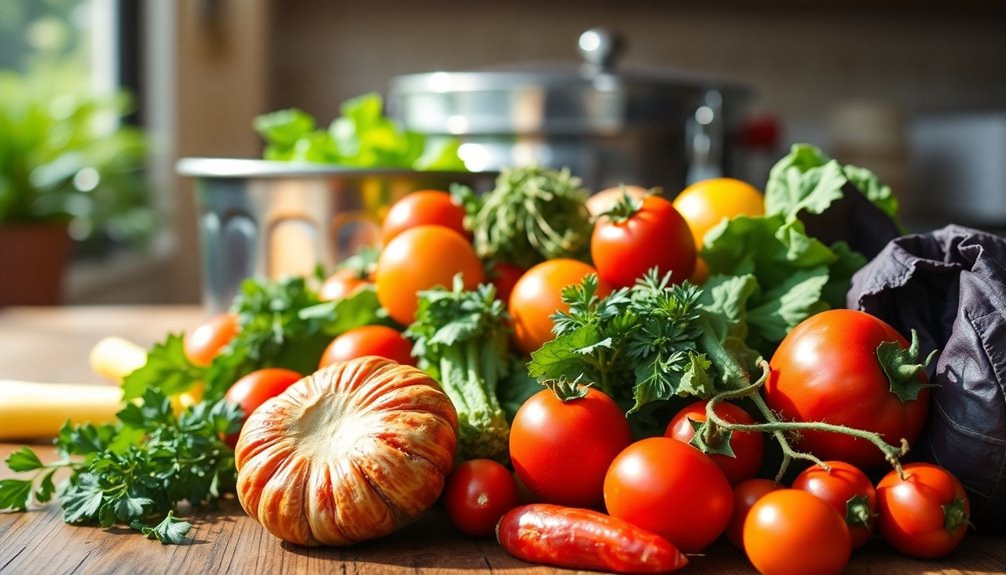
Minimizing food waste is an essential step in reducing your carbon footprint and promoting sustainability. When you waste food, you're not just throwing away leftovers; you're also discarding the resources used to produce, transport, and store those items. This can have a significant impact on the environment.
One effective way to tackle food waste is through meal planning strategies. By planning your meals for the week, you can create a shopping list that aligns closely with what you'll actually consume. This prevents impulse buys and helps you avoid over-purchasing, which often leads to food going bad.
Think about incorporating versatile ingredients that can be used in multiple meals to maximize their utility. Additionally, understanding the importance of liver health can motivate you to choose fresher, less processed foods that not only benefit your body but also reduce waste.
Another practical approach is composting leftovers. Instead of tossing scraps in the trash, consider starting a compost bin. This not only reduces landfill waste but also creates nutrient-rich soil for your garden or plants.
You'll feel a sense of belonging to a community of eco-conscious individuals who are working together to create a healthier planet.
Additionally, get creative with your leftovers. Transform them into new dishes or freeze them for later use. Sharing excess food with neighbors or local organizations can also make a difference.
Opt for Sustainable Seafood
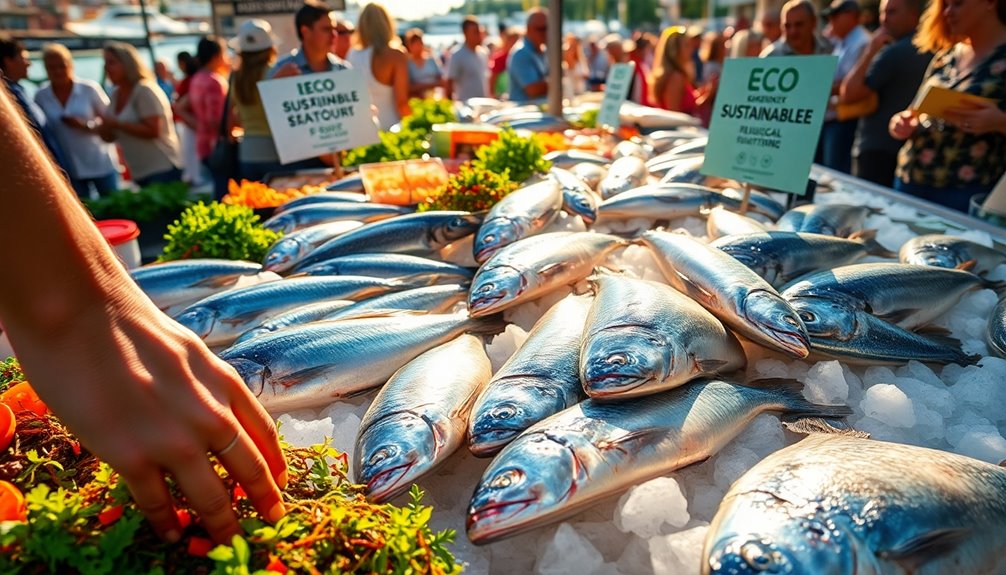
Choosing sustainable seafood is an essential step in your journey towards a lower carbon footprint. By selecting seafood sourced from responsible fisheries or fish farming operations, you're making a conscious choice that benefits both the environment and your community.
Overfishing impacts not only the ocean ecosystem but also the livelihoods of those who depend on fishing for their income.
When you opt for sustainably sourced seafood, you're helping to safeguard that fish populations remain stable and that marine habitats are preserved. Research shows that sustainable fisheries implement practices that minimize bycatch and protect the natural environment, making your meal choices more impactful than you might think.
Fish farming, when done responsibly, can provide an excellent alternative to wild-caught seafood. It can reduce pressure on overexploited fish stocks and supply you with fresh, nutritious options. Unique training strategies in sustainable seafood sourcing encourage methods that not only support fish populations but also promote overall ecological health.
Look for labels such as "Marine Stewardship Council" (MSC) or "Aquaculture Stewardship Council" (ASC) to guide your choices. These certifications indicate that the seafood was sourced through practices aiming to protect the oceans and promote ecological health.
Be Mindful of Packaging
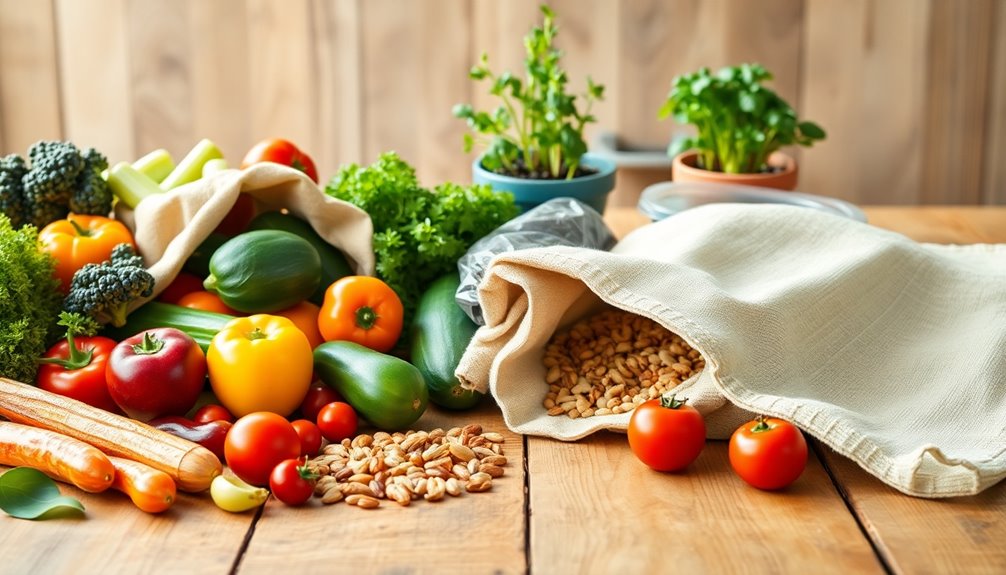
When it comes to reducing your carbon footprint, being mindful of packaging plays an important role in your overall dietary impact. The choices you make around packaging can greatly influence environmental sustainability. By opting for eco-friendly containers and sustainable packaging, you contribute to a healthier planet. Here are four practical tips to help you become more mindful of packaging:
- Choose Bulk Options: When possible, buy in bulk to minimize packaging waste. This not only reduces the amount of material used but can also save you money.
- Select Eco-Friendly Containers: Opt for products packaged in recyclable, biodegradable, or compostable containers. Look for labeling that indicates sustainability practices, and support brands committed to eco-friendly practices.
- Avoid Single-Use Plastics: Steer clear of items wrapped in single-use plastic. Instead, seek out products in reusable bags or containers. This small shift can make a substantial difference in reducing plastic pollution.
- Bring Your Own Containers: When shopping or dining out, consider bringing your own containers for takeout or grocery purchases. Many stores and restaurants are now accommodating this practice, allowing you to minimize waste further. Additionally, using eco-friendly containers can enhance your overall health and vitality while supporting sustainability.
Grow Your Own Food
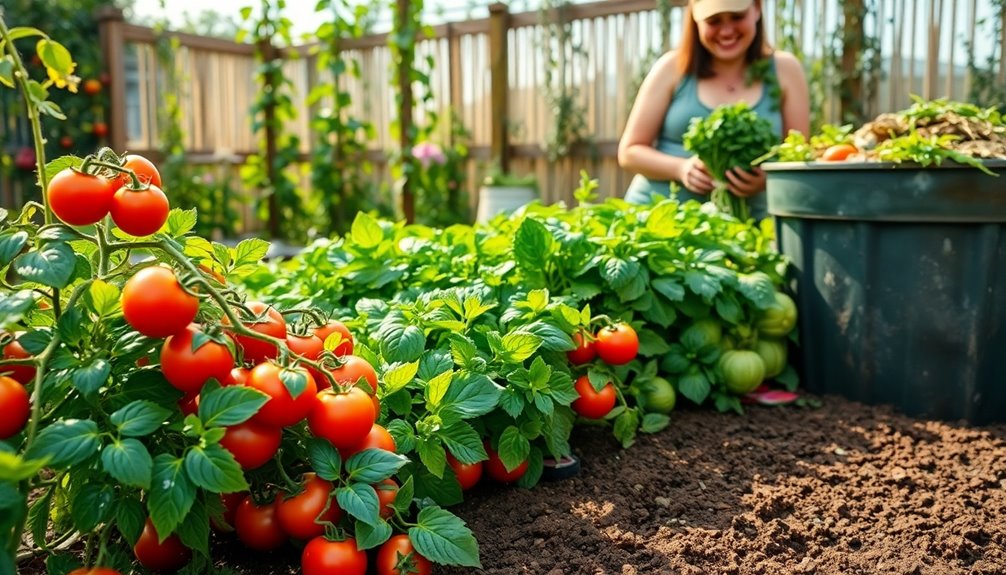
Growing your own food not only provides fresh produce but also greatly reduces your carbon footprint. By cultivating your own vegetables and herbs, you cut down on the energy and resources required for transportation and packaging. Whether you have a backyard, balcony, or just a sunny windowsill, urban gardening is a practical way to connect with nature while contributing to sustainability.
Urban gardening allows you to grow food in small spaces, making it accessible for city dwellers. You can start with easy-to-grow plants like tomatoes, lettuce, and herbs. These not only thrive in limited spaces but also enhance your meals with flavor and nutrition. Additionally, engaging in community farming can deepen your connection with others who share your passion for sustainability.
Joining a local community garden not only provides a platform to learn from experienced growers but also fosters a sense of belonging and camaraderie. As you plant seeds and nurture your crops, you'll witness the tangible impact of your efforts. You're not just reducing your carbon footprint; you're also promoting biodiversity and improving local soil health. Moreover, incorporating mini bands for effective workouts into your gardening routine can enhance your physical fitness while you cultivate your plants. Plus, there's something incredibly rewarding about harvesting your own food, knowing it's fresh and free from harmful pesticides.
Educate Yourself and Others
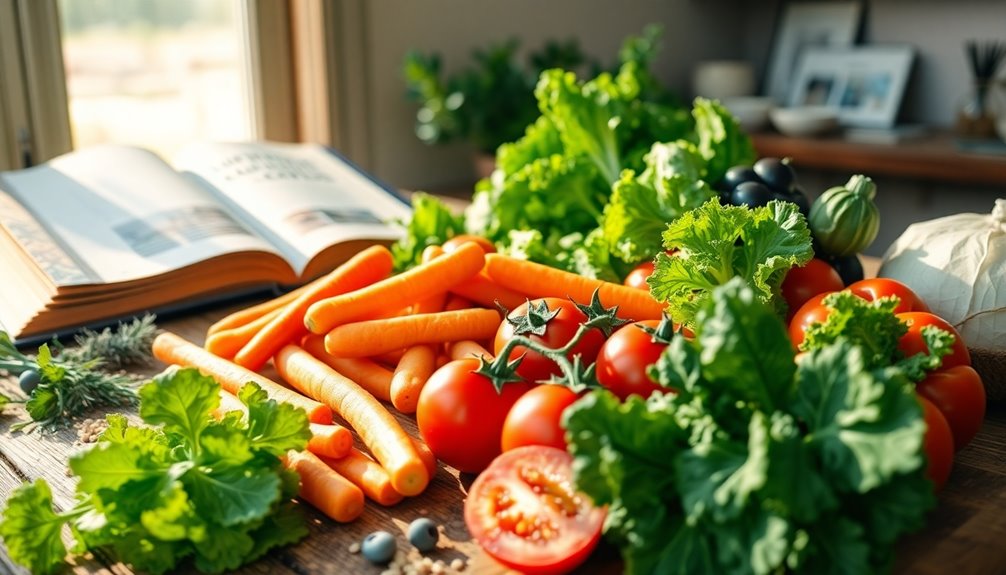
A solid understanding of sustainable practices can greatly enhance your efforts to reduce your carbon footprint through diet. The more you know, the better you can make informed choices and inspire others to do the same. Education is a powerful tool, and by sharing knowledge, you can help cultivate a community that prioritizes sustainability. Research has shown that customized meal plans can significantly benefit individuals looking to improve their dietary habits while being mindful of their environmental impact.
Here are four effective ways to educate yourself and others:
- Attend Educational Workshops: Seek out local workshops that focus on sustainable eating practices. These sessions often provide hands-on experiences, making the information more relatable and actionable.
- Participate in Advocacy Campaigns: Join or support campaigns that promote plant-based diets or local food systems. Engaging in these initiatives can amplify your voice and connect you with like-minded individuals.
- Organize Awareness Campaigns: Consider starting an awareness campaign in your community. Use social media or local events to share facts about the environmental impact of dietary choices and how small shifts can lead to significant changes.
- Engage in Community Outreach: Work with local organizations to provide resources and information about sustainable eating. This could involve creating pamphlets, hosting discussions, or collaborating with schools.
Frequently Asked Questions
How Can I Track My Personal Carbon Footprint Effectively?
To track your personal carbon footprint effectively, start by monitoring your energy consumption, including electricity and transportation. Use apps or online calculators to log your daily habits and identify areas for improvement.
Engage in carbon offsetting by investing in renewable energy projects or tree planting initiatives.
Are Organic Foods More Sustainable Than Conventional Ones?
Organic foods often come from farming practices that prioritize sustainability, such as crop rotation and reduced pesticide use. These methods can enhance soil health and biodiversity, making organic options generally more sustainable than conventional ones.
However, in order to make informed decisions, it's crucial to take into account factors like transportation and local sourcing.
You're part of a community that values responsible choices, so choosing organic when feasible not only supports the environment but also links you with like-minded individuals.
What Role Do Food Transportation Methods Play in Carbon Emissions?
Food transportation methods have a substantial impact on your carbon emissions. You mightn't realize it, but the food miles your groceries travel can lead to high transportation emissions. Locally sourced foods generally have lower food miles, reducing those emissions.
How Do Cooking Methods Impact My Carbon Footprint?
Your cooking methods greatly affect your carbon footprint. By choosing energy-efficient appliances and techniques, you can reduce your environmental impact. For instance, using a pressure cooker or microwave saves energy compared to traditional ovens.
Embracing sustainable culinary habits, like batch cooking or using seasonal ingredients, further enhances your efforts. Every choice you make in the kitchen contributes to a collective commitment to sustainability, helping you feel connected to a community that values the planet.
Can My Dietary Changes Affect Local Economies Positively?
When you change your diet, it's like planting seeds of change in your community. By embracing local sourcing, you're not just feeding yourself; you're nourishing your local economy. Supporting nearby farms and markets creates jobs and strengthens community ties, leading to a vibrant economic impact.
Each meal you choose can ripple through your neighborhood, fostering a sense of belonging and connection, and ultimately transforming how your community thrives together.
Conclusion
By making conscious dietary choices, you can become a steward of the Earth, nurturing both your health and the planet's wellbeing. Each meal you savor can either sow seeds of sustainability or contribute to a growing environmental crisis. Embrace local produce, lean toward plant-based options, and minimize waste like a gardener tending to a vibrant garden. Together, let's cultivate a future where our plates reflect a commitment to a greener, healthier world for generations to come.

